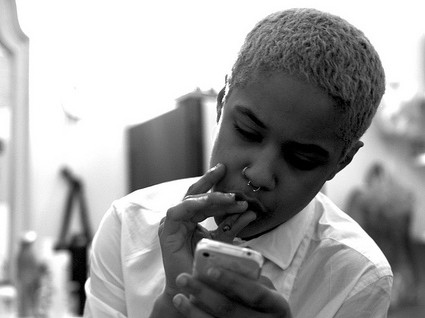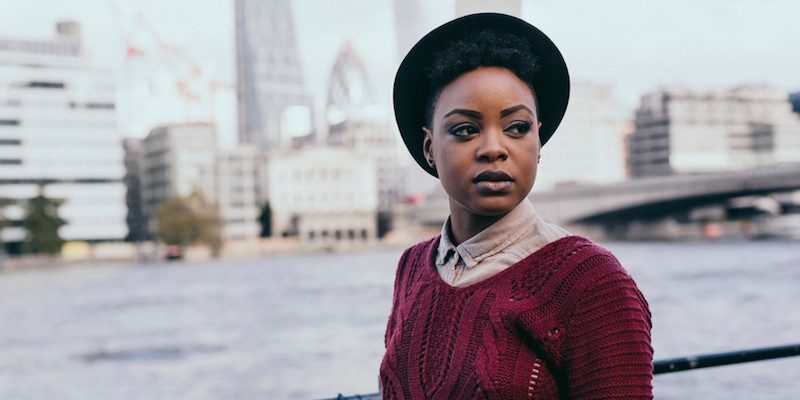Lesbians are, by nature, exposed to a slew of ignorance, sexualization, and “off-the-side” expressions of homophobia (or, as I like to call it, homo-naivety) as it pertains to our lifestyles. It’s no one’s business most of the time, but for some reason people keep saying the same things – over and over again.
I recently conducted an anonymous survey to find out the things that we’re all tired of – and the results were (largely) predictable. Here are the 13 most common answers, in no particular order (along with my favorite sarcastic responses, just because!):
1. “How do you have sex [with a woman]?” or “Lesbian sex isn’t real sex.”
There’s this sexualization of lesbians that occurs mostly by straight men and bi-curious women, and it’s tiring to answer this question repeatedly. It usually comes from the newer ally, or those who are socially awkward.
But sex is personal, and especially among lesbians the definition for “what counts as sex” can vary greatly. Ask a heterosexual couple, for example, and they’re likely to say that oral sex isn’t really sex. To most, the word “sex” includes genital penetration with genitals, or maybe anal penetration with genitals. For lesbians, sex is so much more than that.
The most tactful answer for this particular question, is, of course: “Quite well, thank you.” A bow or a curtsy can really seal the deal. If they’ve said “lesbian sex isn’t real”, it’s best to not reply. (You won’t get them to understand unless you give a graphic description, which is, of course, none of their business.)
2. “Can I watch?”
This one is probably more common overall than the “how” question. Again, it’s usually coming from the straight men and the bi-curious women. They have an idea about how lesbian sex works, because of the porn industry and their own fantasies, but they’ve got to check out “the real thing” – just to see if they’re right.
The problem with this is, it’s rude to ask to watch someone have sex. Some people don’t mind an audience, but generally speaking, if they want you to watch, they’ll ask you. By asking, you just make things awkward and uncomfortable for everyone.
Best answer? “I’ll let you know when we start selling tickets.” Then, if you ever do let them watch, you can at least charge them. Everybody wins!
3. “Are you sure you’re gay?” or, “How do you know if you’ve never been with a guy?”
There are some people who just find it absolutely hard to believe that someone can know for sure if they’re gay. In my experience, the people who ask this aren’t really questioning your sexuality – but their own. They want to validate themselves by having you tell them some sign that says they’re straight, for sure.
But no one should have to justify themselves to someone else. Your identity is for you to define, and everyone is entitled to their own. Remember that they’re just questioning themselves, and try not to be too catty with your response.
My personal favorite? “How do you know you’re not gay?” Seems to get them thinking. If they’re particularly pushy about it, I like to tell them they should try sex with a guy. You know, just to be sure.
4. “You don’t look gay.”
If there’s one thing that the past few years have taught me, it’s that you definitely cannot judge a book by its cover. So many of the things I was painfully excited about were a huge freakin’ disappointment, and things I dreaded turned out to be the best of all. My point is, you don’t really know as much as you think you do. Sometimes you might even be downright ignorant.
Ignorance isn’t automatically a bad thing, though. The difference between ignorance and stupidity is that you can’t fix stupid. The ignorant can be educated, and in most cases they can go on to be more intelligent people afterwards.
My favorite response when someone tells me I don’t look gay is “I look a whole lot gayer with a vagina on my face, but I left it at home today.” I try not to use this one with people I care about, because… Well, my out-loud voice is a bit less demure.
5. “Why do you use a strap-on if you don’t like [penis]?”
This is a question that gets asked a lot, and it’s terrible for so many reasons. First of all, the assumption that all lesbians like strap-ons (or any sex toys) is ignorant to start. Thinking that you’re entitled to ask that sort of question is rude. Often, these people have never been in a sex shop to see that there is a huge variety of toys for those who are interested in them, many of which don’t even slightly resemble a penis. (My old favorite was one that was shaped like a giant finger – have you seen those ones?!)
Then there’s the possibility that the “receiving partner” does, in fact, like men – which causes its own set of flaws in the logic of the question-asker. And there’s the possibility that seems all the more obvious: The fact that a strap-on is definitely not, and never will be, a penis. There are so many fundamental differences, even in the most “realistic” ones.
I don’t really respond to this one a lot, because I find it best to walk away in this scenario. If you have a response to suggest, please leave it in the comments below!
6. “Is scissoring real?”
So, so many of the things on this list involve our sex lives, and that is so disappointing to me. This one especially is a divided issue, because there is confusion surrounding it even within the lesbian community. Some women love it, some women say it’s fake, but one thing’s for certain: It’s no one else’s business.
From my personal standpoint, it’s not so much that scissoring is fake as it is that it’s unlike its depiction in porn. Those who enjoy it will know exactly what I’m talking about, but those who only have porn to refer to will understandably not know.
My favorite answer to this question is, “Is anything real? How do we ever really know?” Works like a charm – especially if the question-asker is particularly philosophical.
7. “If you don’t like guys, why do you like girls who look like guys?”
I know the butch-lovers among us will be very familiar with this question. Some guys (and girls) can’t wrap their head around the idea that clothing doesn’t really have a gender. Even when it does, there are different cultures that look at things different ways anyway. High heels used to be for men, wigs used to be for men, Jesus walked around in a dress… (Before I get any backlash here, I know it’s not a dress, but bear with me.)
By this logic, that means that all clothes are men’s clothes. And women have been wearing “men’s clothes” their whole lives. Maybe there are different cuts, but that’s not really a gender thing – it’s a fashion preference thing. Butch women aren’t “appropriating” anything. They’re wearing what they feel comfortable and attractive in – just like you.
If you get asked this question a lot, I recommend you lean in real close and whisper, “I don’t know if you know this – but there’s a woman under those clothes.” If you can give an innocent giggle with it, the delivery can be that much smoother.
8. “Aren’t lesbians supposed to look like men?”
This one goes along with #7, but it deserved its own slot. It is absolutely amazing to me that butch women (or “lesbians who look like men”) are becoming the unicorns of the gay community, and yet they are still the chosen symbol to identify all of us. If we don’t look like the Honorary Lesbian Mascot, we’re not really lesbians. We have to “prove it”.
I think this might be the whole “ten percent” thing. Presumably 10% of everyone is homosexual, but I’m pretty sure that number is arbitrary. Maybe 10% of the population is out and flamboyantly gay – but the invisible community is much higher. We just don’t stick out.
A great response to this ignorant comment is, “Ssh… I’m undercover!” This will have them thinking that lesbians are super-secret spies on a mission to steal their women… And maybe they’ll start to treat them better!
9. “You should dress more butch/less butch.”
It never fails: Someone thinks that the way you dress is their concern. I don’t get it, because I don’t even care how I dress, but I don’t particularly like being told how I can or cannot dress. I dress myself in a way that is comfortable and respectable, and that’s all any of us should really care about. Right?
It’s not always about your femininity or masculinity, though. Whenever someone tells you how you should dress, they’re assuming that your appearance is their responsibility. It would be flattering if it wasn’t so presumptive.
My favorite answer to this one is “If you buy it, I’ll wear it.” Then again, I’m cheap and don’t like buying myself stuff, so if someone’s going to buy me some new clothes, that’s just that much longer before I have to spend my own money!
10. “But you’re transgender/agender/genderqueer… So you’re not really gay.”
It makes me pretty sad that this one showed up in my results for this survey, because this year has been absolutely tragic for so many transgender lives. Admittedly I have learned so much about being a good ally to our trans sisters, too – but the world at large just isn’t there yet.
Ladies, gentlemen, and everyone else: Let me say it again. Your identity is personal, and you are free to define it or leave it vague, as you wish. No one can make their own claims about you without your approval. Everything else is just slander.
I obviously have no experience dealing with transphobic comments, so if someone could provide a good retort in the comments section, I would greatly appreciate it!
11. “Were you abused when you were a child? Is that why you’re gay?”
This is your classic case of “correlation and causation” confusion at action on a daily basis for so many of us. Those of us who were victims of abuse can fall prey to it, too – We may question whether our abuse caused our sexuality, or if we were really gay before the abuse happened. The answers may be different from person to person, and I make no assumption on what your story is. (If you’d like to share it anonymously, I’d love to help you with it – but I cannot pretend to understand any case that isn’t like my own.)
For those who were never abused, the retort can seem easier. If you’ve thought about “the origins of your gayness” story (whether true or sarcastic) you can share that with them. Otherwise, you can just respond with a simple “no” and move on with it.
In my personal scenario, the answer is a little different. I was abused after I came to terms with my sexuality, but before I had come out. I can honestly answer, “What makes you think I was attracted to the person who raped me?” It tends to make people more uncomfortable than it makes me, but not everyone is comfortable speaking about their abuse. You are under no obligation to justify yourself to a stranger, or even a loved one.
12. “I knew you were gay, because…”
No. Just stop. This one always relies on some stereotype. Things that hold true for many lesbians, but because they hold true for many people. When I was a kid, I wore boy’s clothes and girl’s clothes; I played with dolls and monster trucks; I played softball and did ballet; I had guy friends and girl friends (although I did spend a lot more time alone with the girls – maybe that’s a sign?).
The truth is, there’s no way to tell someone’s gay unless they tell you. You can make speculations, but it’s important that you understand you’re just guessing. If you’re right, you’re right, but it’s not because of your superior logic – it’s because you flipped a coin and it landed on the side you wanted.
I used to play into this one a lot when I was younger. I’d exaggerate the stories to make myself seem “even gayer”. Nowadays, my favorite answer is “Oh really? I knew because my Barbies were all gay.” (Almost true story, though. I had one Prince Eric doll, but of course he only went with Ariel – the rest of my Barbies made out with each other.)
13. “Are you going to get married now?” or “Did you marry your girlfriend when it became legal?”
This is something I feared back when it was “temporarily legal”. I just knew that there would be people who rushed into marriage because it was only available right then, and then they’d get divorced in a few years and play into the statistics just because they couldn’t afford to wait until they knew for sure.
Thankfully, I haven’t heard many stories of my fears coming true, which I think is wonderful – good job, ladies! – but the point still remains that rushing into a deep commitment is very rarely a good idea. I talk about it all the time, but seriously – if you can’t say for sure if your partner is “the one”, she’s probably not “the one”.
My favorite answer to this question is “Oh you misunderstand. I’m not a Uhaul lesbian, I’m a cat-lady lesbian.” Sometimes people get confused, but most of the time they switch to the right stereotype really quick and I can go on with my day.
What are some other questions (or comments) you’re tired of hearing? I would love to hear your stories – my study had a very small sample, and I am always interested in seeing other viewpoints. Drop a comment to let us know what ignorance you want to leave in 2015!
[interaction id=”55e4bd3dd126414f21123128″]








































